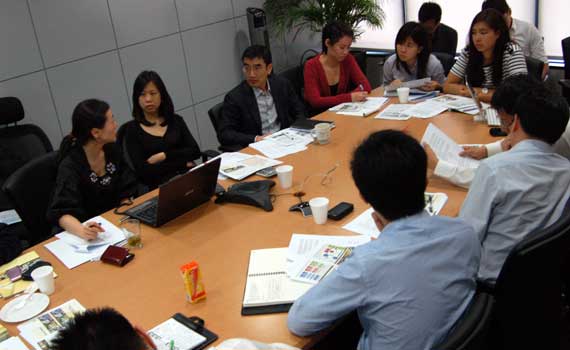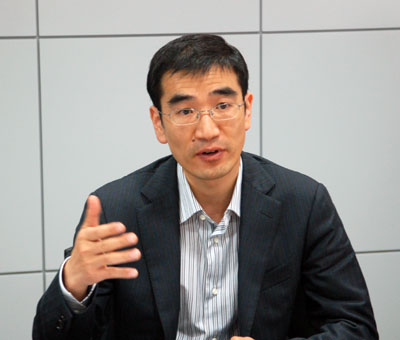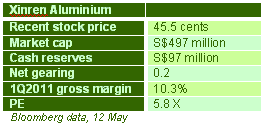
ALUMINUM CONSUMPTION in China is expected to grow 12% to 18.5 million tons this year, the result of its rapid urbanization and industrialization. But even as turnovers surge, companies are finding that their bottom line depends on how inflationary pressures are managed.
As one of China’s 20 largest aluminum producers, Xinren Aluminum’s turnover surged 57.1% year-on-year to Rmb 1,994.3 million for 1Q2011, thanks to increased sales volume of primary aluminum ingots and increased export sales of aluminum plates.
However, its net profit attributable to shareholders contracted by 25.0% to Rmb 112.7 million, mainly due to increase in costs of electricity and alumina, which each account for about 30% of its cost of goods sold.

Sales from smelting of primary aluminum ingots and plates increased about 13.6% to Rmb 1,055 million. However, segment profit before tax declined by 17% to Rmb 149.4 million.
Sales of fabricated aluminum sheets, coils and foils increased about 20.8% to Rmb 148 million due to a slight increase in the selling price of its fabricated aluminum products.
However, segment profit before tax declined by 12.7% to Rmb 23.9 million.
Xinren also trades in aluminum products on a back-to-back basis to make up for short falls in its production.
Trading revenues more than tripled (up 262.8%) to Rmb 791 million. However, it booked a segment loss before taxation of about Rmb 15 million.
Profit before taxation decreased by about 27.2% to Rmb 147 million due to increases in administrative expenses such as the operation of its Singapore office, as well as entertainment and traveling arising from an increase in sales activities.
The company had cash and cash equivalents of Rmb 512 million as at 31 March 2011.
Xinren’s executive director, Mr Liang Hongbo, and its Financial Controller, Ms Lim Joo Seng, addressed questions raised by investors at its results briefing held at its office on 11 May. Below is a summary of questions raised at the investor briefing and the management’s replies.
Q: Why was there a disproportionately large decline in gross profit compared to the rise in cost of electricity and in alumina prices?
Margins were exceptionally good last year. We sold a large volume of primary aluminum in Jan 2010 at a good price --- above Rmb 17,000 per ton.
This Jan, it was only Rmb 16,700. Secondly, we managed to buy a large amount of alumina at very low prices in 2009 during the financial crisis, and that resulted in exceptionally good margins during 1Q2010.
Q: Since electricity bills are unlikely to decline, should we expect margin levels to stay at first quarter levels?
Yes, that is correct.
Q: Your trading segment has been losing money since the last quarter. Why have you persisted in increasing top line contribution in this segment from 17% in 1Q2010 to about 40% in 1Q2011?
Export prices for aluminum were better compared to domestic prices during 1Q2011. For example, the VAT rebate amounts to Rmb 2,000 a ton. So, we entered contracts with important trading customers such as China Aluminum Co (Chalco) to supply them with aluminum products.
When demand for aluminum spiked, we found ourselves short on inventory and had to make purchases from the open market, thereby incurring transaction, administration and even shipping costs.
For the upcoming quarter, we intend to renegotiate our contracts to pass on these out-of-pocket expenses that arise from extraordinarily large contracts.
 Q: What’s the timeline for your production and sales?
Q: What’s the timeline for your production and sales?
We buy alumina 2 to 3 months in advance. We sell our aluminum ingots within 7 days of smelting. We do not keep inventory for this. For our exports of aluminum plates, we sell these within one month of production.
We give ourselves greater flexibility in pricing for exports, and fix the contract when we feel that prices are relatively good.
Q: Why do you need to lock yourself to long term contracts to procure alumina from Chalco and Minmetal?
There is greater price volatility on the open market.
Q: Why don't you issue shares for the 2 smelters that you are going to acquire from the founding family and opt to pay cash instead?
The purchase consideration amounts to 17.1% of Xinren’s market cap. If we issue shares, there will be dilution to the minority shareholders.
Related story: XINREN: Hopeful Of Aluminum Price Rise, To Strengthen Internal Controls







